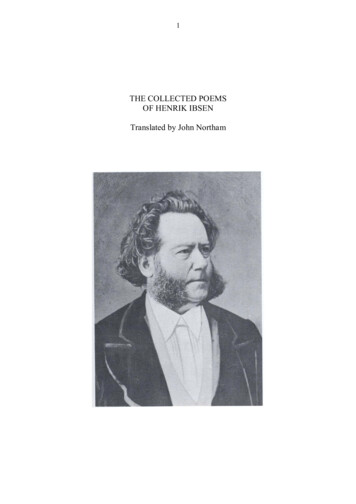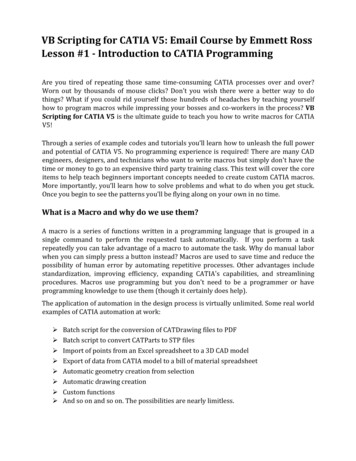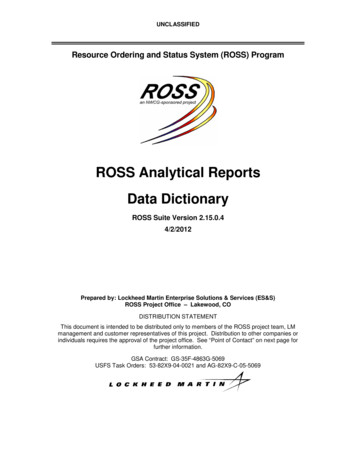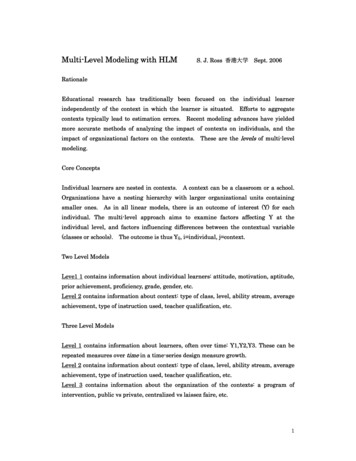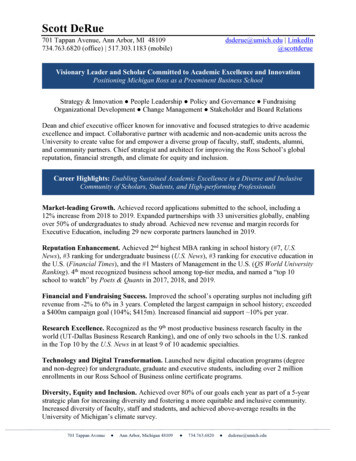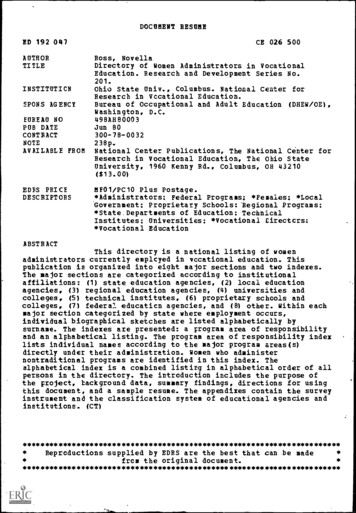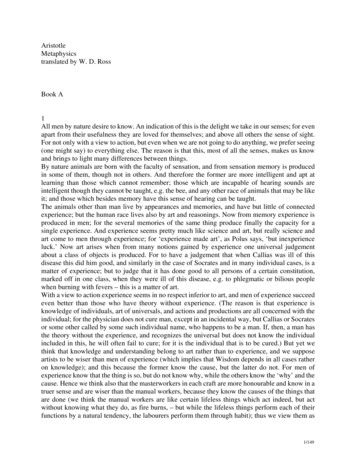
Transcription
AristotleMetaphysicstranslated by W. D. RossBook Α1All men by nature desire to know. An indication of this is the delight we take in our senses; for evenapart from their usefulness they are loved for themselves; and above all others the sense of sight.For not only with a view to action, but even when we are not going to do anything, we prefer seeing(one might say) to everything else. The reason is that this, most of all the senses, makes us knowand brings to light many differences between things.By nature animals are born with the faculty of sensation, and from sensation memory is producedin some of them, though not in others. And therefore the former are more intelligent and apt atlearning than those which cannot remember; those which are incapable of hearing sounds areintelligent though they cannot be taught, e.g. the bee, and any other race of animals that may be likeit; and those which besides memory have this sense of hearing can be taught.The animals other than man live by appearances and memories, and have but little of connectedexperience; but the human race lives also by art and reasonings. Now from memory experience isproduced in men; for the several memories of the same thing produce finally the capacity for asingle experience. And experience seems pretty much like science and art, but really science andart come to men through experience; for ‘experience made art’, as Polus says, ‘but inexperienceluck.’ Now art arises when from many notions gained by experience one universal judgementabout a class of objects is produced. For to have a judgement that when Callias was ill of thisdisease this did him good, and similarly in the case of Socrates and in many individual cases, is amatter of experience; but to judge that it has done good to all persons of a certain constitution,marked off in one class, when they were ill of this disease, e.g. to phlegmatic or bilious peoplewhen burning with fevers – this is a matter of art.With a view to action experience seems in no respect inferior to art, and men of experience succeedeven better than those who have theory without experience. (The reason is that experience isknowledge of individuals, art of universals, and actions and productions are all concerned with theindividual; for the physician does not cure man, except in an incidental way, but Callias or Socratesor some other called by some such individual name, who happens to be a man. If, then, a man hasthe theory without the experience, and recognizes the universal but does not know the individualincluded in this, he will often fail to cure; for it is the individual that is to be cured.) But yet wethink that knowledge and understanding belong to art rather than to experience, and we supposeartists to be wiser than men of experience (which implies that Wisdom depends in all cases ratheron knowledge); and this because the former know the cause, but the latter do not. For men ofexperience know that the thing is so, but do not know why, while the others know the ‘why’ and thecause. Hence we think also that the masterworkers in each craft are more honourable and know in atruer sense and are wiser than the manual workers, because they know the causes of the things thatare done (we think the manual workers are like certain lifeless things which act indeed, but actwithout knowing what they do, as fire burns, – but while the lifeless things perform each of theirfunctions by a natural tendency, the labourers perform them through habit); thus we view them as1/149
being wiser not in virtue of being able to act, but of having the theory for themselves and knowingthe causes. And in general it is a sign of the man who knows and of the man who does not know,that the former can teach, and therefore we think art more truly knowledge than experience is; forartists can teach, and men of mere experience cannot.Again, we do not regard any of the senses as Wisdom; yet surely these give the most authoritativeknowledge of particulars. But they do not tell us the ‘why’ of anything – e.g. why fire is hot; theyonly say that it is hot.At first he who invented any art whatever that went beyond the common perceptions of man wasnaturally admired by men, not only because there was something useful in the inventions, butbecause he was thought wise and superior to the rest. But as more arts were invented, and somewere directed to the necessities of life, others to recreation, the inventors of the latter were naturallyalways regarded as wiser than the inventors of the former, because their branches of knowledge didnot aim at utility. Hence when all such inventions were already established, the sciences which donot aim at giving pleasure or at the necessities of life were discovered, and first in the places wheremen first began to have leisure. This is why the mathematical arts were founded in Egypt; for therethe priestly caste was allowed to be at leisure.We have said in the Ethics what the difference is between art and science and the other kindredfaculties; but the point of our present discussion is this, that all men suppose what is called Wisdomto deal with the first causes and the principles of things; so that, as has been said before, the man ofexperience is thought to be wiser than the possessors of any sense-perception whatever, the artistwiser than the men of experience, the masterworker than the mechanic, and the theoretical kinds ofknowledge to be more of the nature of Wisdom than the productive. Clearly then Wisdom isknowledge about certain principles and causes.2Since we are seeking this knowledge, we must inquire of what kind are the causes and theprinciples, the knowledge of which is Wisdom. If one were to take the notions we have about thewise man, this might perhaps make the answer more evident. We suppose first, then, that the wiseman knows all things, as far as possible, although he has not knowledge of each of them in detail;secondly, that he who can learn things that are difficult, and not easy for man to know, is wise(sense-perception is common to all, and therefore easy and no mark of Wisdom); again, that hewho is more exact and more capable of teaching the causes is wiser, in every branch of knowledge;and that of the sciences, also, that which is desirable on its own account and for the sake of knowingit is more of the nature of Wisdom than that which is desirable on account of its results, and thesuperior science is more of the nature of Wisdom than the ancillary; for the wise man must not beordered but must order, and he must not obey another, but the less wise must obey him.Such and so many are the notions, then, which we have about Wisdom and the wise. Now of thesecharacteristics that of knowing all things must belong to him who has in the highest degreeuniversal knowledge; for he knows in a sense all the instances that fall under the universal. Andthese things, the most universal, are on the whole the hardest for men to know; for they are farthestfrom the senses. And the most exact of the sciences are those which deal most with first principles;for those which involve fewer principles are more exact than those which involve additionalprinciples, e.g. arithmetic than geometry. But the science which investigates causes is alsoinstructive, in a higher degree, for the people who instruct us are those who tell the causes of eachthing. And understanding and knowledge pursued for their own sake are found most in theknowledge of that which is most knowable (for he who chooses to know for the sake of knowing2/149
will choose most readily that which is most truly knowledge, and such is the knowledge of thatwhich is most knowable); and the first principles and the causes are most knowable; for by reasonof these, and from these, all other things come to be known, and not these by means of the thingssubordinate to them. And the science which knows to what end each thing must be done is the mostauthoritative of the sciences, and more authoritative than any ancillary science; and this end is thegood of that thing, and in general the supreme good in the whole of nature. Judged by all the testswe have mentioned, then, the name in question falls to the same science; this must be a science thatinvestigates the first principles and causes; for the good, i.e. the end, is one of the causes.That it is not a science of production is clear even from the history of the earliest philosophers. Forit is owing to their wonder that men both now begin and at first began to philosophize; theywondered originally at the obvious difficulties, then advanced little by little and stated difficultiesabout the greater matters, e.g. about the phenomena of the moon and those of the sun and of thestars, and about the genesis of the universe. And a man who is puzzled and wonders thinks himselfignorant (whence even the lover of myth is in a sense a lover of Wisdom, for the myth is composedof wonders); therefore since they philosophized order to escape from ignorance, evidently theywere pursuing science in order to know, and not for any utilitarian end. And this is confirmed bythe facts; for it was when almost all the necessities of life and the things that make for comfort andrecreation had been secured, that such knowledge began to be sought. Evidently then we do notseek it for the sake of any other advantage; but as the man is free, we say, who exists for his ownsake and not for another’s, so we pursue this as the only free science, for it alone exists for its ownsake.Hence also the possession of it might be justly regarded as beyond human power; for in many wayshuman nature is in bondage, so that according to Simonides ‘God alone can have this privilege’,and it is unfitting that man should not be content to seek the knowledge that is suited to him. If,then, there is something in what the poets say, and jealousy is natural to the divine power, it wouldprobably occur in this case above all, and all who excelled in this knowledge would be unfortunate.But the divine power cannot be jealous (nay, according to the proverb, ‘bards tell a lie’), nor shouldany other science be thought more honourable than one of this sort. For the most divine science isalso most honourable; and this science alone must be, in two ways, most divine. For the sciencewhich it would be most meet for God to have is a divine science, and so is any science that dealswith divine objects; and this science alone has both these qualities; for (1) God is thought to beamong the causes of all things and to be a first principle, and (2) such a science either God alonecan have, or God above all others. All the sciences, indeed, are more necessary than this, but noneis better.Yet the acquisition of it must in a sense end in something which is the opposite of our originalinquiries. For all men begin, as we said, by wondering that things are as they are, as they do aboutself-moving marionettes, or about the solstices or the incommensurability of the diagonal of asquare with the side; for it seems wonderful to all who have not yet seen the reason, that there is athing which cannot be measured even by the smallest unit. But we must end in the contrary and,according to the proverb, the better state, as is the case in these instances too when men learn thecause; for there is nothing which would surprise a geometer so much as if the diagonal turned out tobe commensurable.We have stated, then, what is the nature of the science we are searching for, and what is the markwhich our search and our whole investigation must reach.3/149
3Evidently we have to acquire knowledge of the original causes (for we say we know each thingonly when we think we recognize its first cause), and causes are spoken of in four senses. In one ofthese we mean the substance, i.e. the essence (for the ‘why’ is reducible finally to the definition,and the ultimate ‘why’ is a cause and principle); in another the matter or substratum, in a third thesource of the change, and in a fourth the cause opposed to this, the purpose and the good (for this isthe end of all generation and change). We have studied these causes sufficiently in our work onnature, but yet let us call to our aid those who have attacked the investigation of being andphilosophized about reality before us. For obviously they too speak of certain principles andcauses; to go over their views, then, will be of profit to the present inquiry, for we shall either findanother kind of cause, or be more convinced of the correctness of those which we now maintain.Of the first philosophers, then, most thought the principles which were of the nature of matter werethe only principles of all things. That of which all things that are consist, the first from which theycome to be, the last into which they are resolved (the substance remaining, but changing in itsmodifications), this they say is the element and this the principle of things, and therefore they thinknothing is either generated or destroyed, since this sort of entity is always conserved, as we saySocrates neither comes to be absolutely when he comes to be beautiful or musical, nor ceases to bewhen loses these characteristics, because the substratum, Socrates himself remains. just so they saynothing else comes to be or ceases to be; for there must be some entity – either one or more thanone – from which all other things come to be, it being conserved.Yet they do not all agree as to the number and the nature of these principles. Thales, the founder ofthis type of philosophy, says the principle is water (for which reason he declared that the earth restson water), getting the notion perhaps from seeing that the nutriment of all things is moist, and thatheat itself is generated from the moist and kept alive by it (and that from which they come to be isa principle of all things). He got his notion from this fact, and from the fact that the seeds of allthings have a moist nature, and that water is the origin of the nature of moist things.Some thi
Metaphysics . translated by W. D. Ross . Book Α . 1 . All men by nature desire to know. An indication of this is the delight we take in our senses; for even apart
